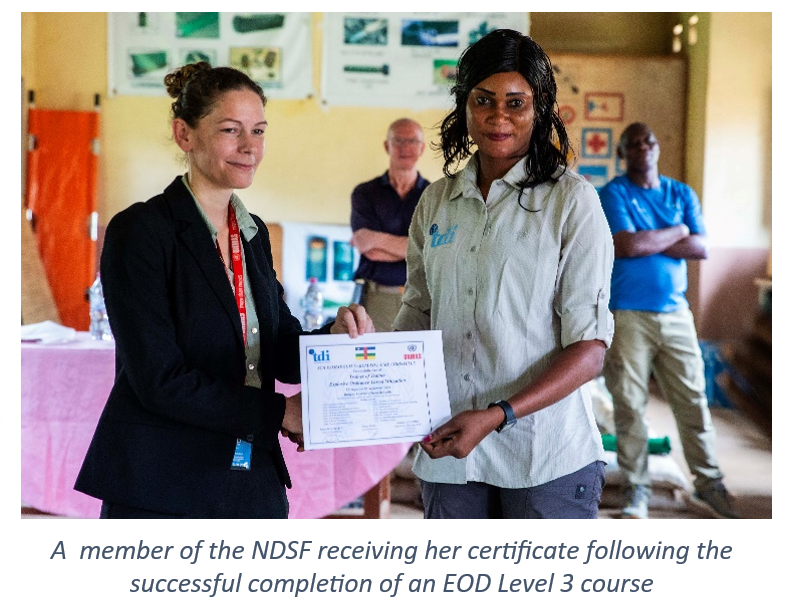ABOUT
Since 2014, UNMAS has played a significant role in enhancing safety, stability, and peacebuilding initiatives in the Central African Republic (CAR). It operates under the auspices of the Multidimensional Integrated Stabilization Mission in CAR (MINUSCA), which has had its mandate extended until November 2026 as per Security Council Resolution 2800 (2025).
IMPACT
Building Safety, Stability, and Peacebuilding Through Mine Action
UNMAS activities are in alignment with the mandate and priorities of MINUSCA, providing essential expertise, operational and capacity-building support to advance protection of civilians, security sector reform and safety and security of peacekeepers. This includes equipping the National Defense and Security Forces (NDSF) with the necessary skills to address the threat posed by explosive ordnance, facilitating the operationalization of the newly established National Mine Action Authority, and ensuring the effective management of weapons and ammunition in line with international standards.
Furthermore, UNMAS enhances the capabilities of MINUSCA uniformed personnel in mitigating explosive ordnance threats, allowing them to operate safely. To protect local communities and enable humanitarian assistance, UNMAS conducts explosive ordnance risk education and awareness sessions. These initiatives play a vital role in safeguarding civilians by preventing accidents and building resilience, restoring and extending State authority, and reforming the security sector, thereby contributing to the establishment of a sustainable peace.
ACTIVITIES
Weapons and Ammunition Management (WAM)
 The proliferation of small arms and light weapons, combined with insufficient national WAM capacity, presents considerable risks to civilians and obstructs peace and development initiatives. UNMAS has achieved significant advancements, such as assisting in the marking and registration of state-owned weapons and the construction and rehabilitation of storage facilities in support of the national authorities.
The proliferation of small arms and light weapons, combined with insufficient national WAM capacity, presents considerable risks to civilians and obstructs peace and development initiatives. UNMAS has achieved significant advancements, such as assisting in the marking and registration of state-owned weapons and the construction and rehabilitation of storage facilities in support of the national authorities.
The WAM training provided by UNMAS has also plays a vital role in enhancing the capabilities of the NDSF, which includes Armed Forces, Gendarmerie, Police, Waters and Forests and Customs officers, by equipping them with crucial WAM knowledge.
 Additional important activities involve assisting in the destruction of obsolete weapons and ammunition in collaboration with national authorities, promoting the adoption of national frameworks and international standards, and facilitating the implementation of the National Action Plan 2024-2028 for the Fight Against the Proliferation of Small Arms and Light Weapons.
Additional important activities involve assisting in the destruction of obsolete weapons and ammunition in collaboration with national authorities, promoting the adoption of national frameworks and international standards, and facilitating the implementation of the National Action Plan 2024-2028 for the Fight Against the Proliferation of Small Arms and Light Weapons.
Despite these accomplishments, needs remain important, particularly after the lifting of the arms embargo in July 2024 and in support of the wider Security Sector Reform plans and initiatives.
Explosive Ordnance Threat Mitigation
 UNMAS leads efforts to mitigate explosive ordnance threats in CAR by providing technical expertise and capacity-building training to both national authorities and MINUSCA uniformed personnel. UNMAS supports in strengthening the capabilities of the MINUSCA Force and Police through training in explosive ordnance risk awareness, military search, mobility planning, and post-blast investigation, alongside technical advice. This ensures readiness and provides peacekeepers with context-specific knowledge and equipment to operate safely and effectively in the Central African threat context.
UNMAS leads efforts to mitigate explosive ordnance threats in CAR by providing technical expertise and capacity-building training to both national authorities and MINUSCA uniformed personnel. UNMAS supports in strengthening the capabilities of the MINUSCA Force and Police through training in explosive ordnance risk awareness, military search, mobility planning, and post-blast investigation, alongside technical advice. This ensures readiness and provides peacekeepers with context-specific knowledge and equipment to operate safely and effectively in the Central African threat context.
Additionally, UNMAS has assisted the government in the creation of a National Mine Action Authority, which will enable the government to regulate, manage, and coordinate mine action efforts within the country, and will continue to support the entity’s operationalization and the gradual national appropriation of a nationally-led mine action programme.
Furthermore, UNMAS conducts national capacity building to equip the NDSF with the capacity to safely and effectively mitigate and respond to explosive ordnance threats and acquire related sustainable national self-training capacities.
 UNMAS efforts also include the delivery of explosive ordnance risk education and awareness sessions to a range of beneficiaries, such as civilians, humanitarian workers, and UN personnel.
UNMAS efforts also include the delivery of explosive ordnance risk education and awareness sessions to a range of beneficiaries, such as civilians, humanitarian workers, and UN personnel.
UNMAS coordinates the humanitarian Mine Action Area of Responsibility in collaboration with the newly-appointed National Coordinator of the National Mine Action Authority, fostering dialogue and collaboration among key stakeholders, and supporting development of national organizations in humanitarian mine action.
In addition, until the full operationalization of the national mine action authority, UNMAS continues to manage mine action information and to ensure quality of control of mine action activities in the Central African Republic.
FUNDING
Currently, UNMAS is entirely financed by MINUSCA’s assessed budget. UNMAS is actively pursuing additional funding sources to develop sustainable projects aimed at enhancing safety, stability, and peacebuilding initiatives in CAR.
For more information: MINUSCA-UNMAS-PROGRAM@un.org; unmas-donor-rel@un.org
Data as of November 2025

